US Treasuries Auction Failure Suggests Stocks Dead Cat Bounce is Over
Stock-Markets / Financial Markets Feb 16, 2008 - 12:23 PM GMT Some wealthy investors got a jolt this week as Goldman Sachs informed them that they would be unable to withdraw their money from an investment considered “safe as cash.” These investments are so-called “ auction rate securities ,” credit instruments now caught in the latest liquidity squeeze. Banks and brokerage houses have sold these instruments to investors, claiming them to be safe. The fact is, they are long-term securities on which the banks hold weekly or monthly auctions to set prices and interest rates. This week's auction was a failure of major proportions.
Some wealthy investors got a jolt this week as Goldman Sachs informed them that they would be unable to withdraw their money from an investment considered “safe as cash.” These investments are so-called “ auction rate securities ,” credit instruments now caught in the latest liquidity squeeze. Banks and brokerage houses have sold these instruments to investors, claiming them to be safe. The fact is, they are long-term securities on which the banks hold weekly or monthly auctions to set prices and interest rates. This week's auction was a failure of major proportions.
We could have seen this coming, after last week's U.S. Treasury auction failure, in which notably absent among the bidders were the major foreign banks. That auction failed, sending U.S. Treasury rates higher and causing a major reversal in the bond market. Now bidders have failed to show in the auction rate securities and the banks have failed to step in and make a market for these securities. The Port Authority of New York and New Jersey saw interest rates on its bonds rise from 4.3% to 20% as a result of the failed auction.
Brokerage firms and commercial banks are not legally obligated to make a market for these securities or quote a price if there is not one given at the auction. Clients unable to liquidate their holdings will argue that theses securities were pitched as short-term investments, not the long-term investments they really are. Now they are being told that their assets are frozen until the next auction in March.
Failed auctions have one upside. Many of the underlying bonds have had to reset their interest rates at a much higher yield, called the fail rate. That means the bonds are still paying interest at the higher rate. This has caused some money market funds to consider investing in these instruments for the first time. But will the bond issuers continue to pay the reset interest rate or will they default? Puerto Rico is already considering its alternatives.
The latest crisis has hit even the most affluent investors .
Fractured fairy tales.
Once upon a time banks had cash reserves upon which they might lend money to their customers. Today, this is a difficult statement to defend. The most recent Federal Reserve Statistical Release shows aggregate non-borrowed reserves at -$18,009,000,000. This is defined as “non-borrowed reserves equal seasonally adjusted, break-adjusted total reserves less unadjusted total borrowings of depository institutions from the Federal Reserve.” Simply put, the banks are now in hock up to their eyeballs to the Federal Reserve.
If you can't flaunt it, hide it.
The Bush Administration has been insisting that the U.S. economy is not heading for a recession. Despite credible economic forecasts of a coming recession, they are deflecting attention by blaming the media's negative emphasis on the news. Their credibility isn't being helped, though, by the recent announcement that they are closing down a web portal maintained by the Economics and Statistics Administration that collects and combines data in a single easy-to-use website. The Bush Administration is shutting it down as of March 1, citing budget constraints. Unfortunately, the media has often used this portal as the source for their so-called negative news.
Is this a C wave?
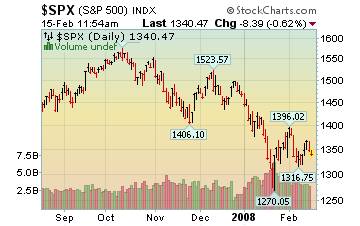 We will soon find out. For those of you who are technically oriented, the next decline may be a third wave of a wave C. So far, the media has been calling for a recovery. The liquidity crises that I have outlined in this newsletter and prior ones suggest not. For the record, let us describe the “personality” of a C wave. “Declining C waves are usually devastating in their destruction. They are third waves and have most of the properties of third waves. The illusions held throughout waves A and B tend to evaporate and fear takes over.” Source: Elliott Wave Principle , by Frost & Prechter. I'll be glad to know I'm wrong after this next decline is done.
We will soon find out. For those of you who are technically oriented, the next decline may be a third wave of a wave C. So far, the media has been calling for a recovery. The liquidity crises that I have outlined in this newsletter and prior ones suggest not. For the record, let us describe the “personality” of a C wave. “Declining C waves are usually devastating in their destruction. They are third waves and have most of the properties of third waves. The illusions held throughout waves A and B tend to evaporate and fear takes over.” Source: Elliott Wave Principle , by Frost & Prechter. I'll be glad to know I'm wrong after this next decline is done.
Bonds in a liquidity crisis?
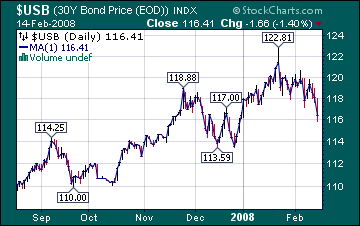 Last week's bond auction failure set the stage for this week's auction rate securities failure, mentioned above. This should be an alarm to investors that have accepted the mantra of “asset allocation.” It used to be that money rotated out of stocks into long-term bonds as equities markets tanked. No longer. The real rotation is now out of stocks and into short-term U. S. Treasury securities. Those in the know are playing it ultra-safe. Maybe you should, too.
Last week's bond auction failure set the stage for this week's auction rate securities failure, mentioned above. This should be an alarm to investors that have accepted the mantra of “asset allocation.” It used to be that money rotated out of stocks into long-term bonds as equities markets tanked. No longer. The real rotation is now out of stocks and into short-term U. S. Treasury securities. Those in the know are playing it ultra-safe. Maybe you should, too.
Can gold weather the liquidity storm?
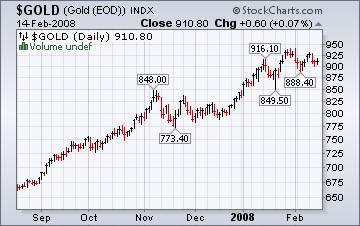 NEW YORK ( MarketWatch ) -- Gold futures edged up Friday underpinned by weakness in the U.S. dollar, as platinum futures hit another record high on persistent worries about supply disruptions in South Africa.
NEW YORK ( MarketWatch ) -- Gold futures edged up Friday underpinned by weakness in the U.S. dollar, as platinum futures hit another record high on persistent worries about supply disruptions in South Africa.
Analysts are still citing a weak dollar-rising oil prices scenario, which would support rising precious metals prices. However, a liquidity crisis might be a wild card to that equation.
It's called a dead-cat-bounce.
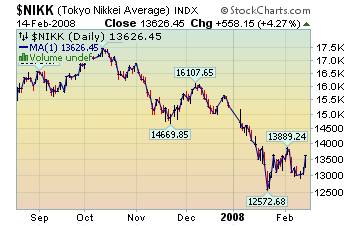 Feb. 13 ( Bloomberg ) -- Japan 's Nikkei 225 Stock Average rose, led by shipping lines after freight prices extended the longest streak of gains in two months.
Feb. 13 ( Bloomberg ) -- Japan 's Nikkei 225 Stock Average rose, led by shipping lines after freight prices extended the longest streak of gains in two months.
The rally was led by cement companies, which bounced after a 57% decline. Bloomberg reports traders making a quick profit, but I would say that it was more probably short sellers covering, instead. I would cover after a 57% decline, too.
The Shanghai Composite is only half-way to its target.
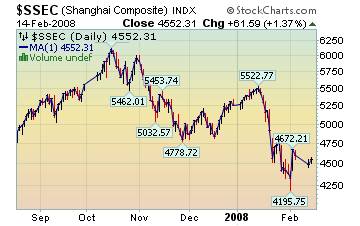 This morning's 1.2% decline (not shown) in the Shanghai Composite suggests that the next wave down has begun. According to Forbes Magazine , investors are afraid that China 's central bank will rein in liquidity by raising interest rates again. I should wonder if they didn't. New bank lending in January was 803.6 billion yuan, up from 566.3 billion yuan a year ago. Will someone please tell them that they cannot borrow their way to prosperity? We should know.
This morning's 1.2% decline (not shown) in the Shanghai Composite suggests that the next wave down has begun. According to Forbes Magazine , investors are afraid that China 's central bank will rein in liquidity by raising interest rates again. I should wonder if they didn't. New bank lending in January was 803.6 billion yuan, up from 566.3 billion yuan a year ago. Will someone please tell them that they cannot borrow their way to prosperity? We should know.
The U.S. Dollar is still being talked down.
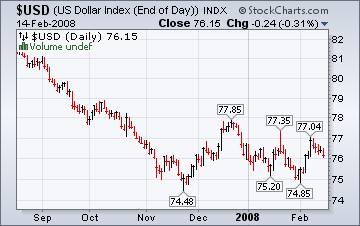 The U.S. Dollar took a hit this morning as the New York Manufacturing Index declined to –11.7 from 9 in January. The Reuters/University of Michigan index of consumer sentiment dropped to 69.6, the lowest since 1992, from January's 78.4. What is not being said is that Europe 's and Japan 's economies and confidence levels are lower than ours. It could be bullish for the dollar. The chart supports that view.
The U.S. Dollar took a hit this morning as the New York Manufacturing Index declined to –11.7 from 9 in January. The Reuters/University of Michigan index of consumer sentiment dropped to 69.6, the lowest since 1992, from January's 78.4. What is not being said is that Europe 's and Japan 's economies and confidence levels are lower than ours. It could be bullish for the dollar. The chart supports that view.
Meet Mr. & Mrs. Walk-Away.
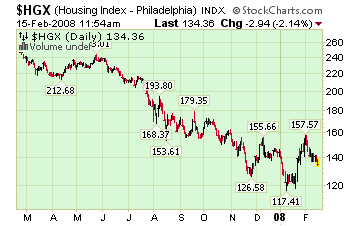
Defaults in the US housing market are spreading from sub-prime to the much larger stock of top-grade housing debt, threatening to set off a wave of even bigger losses for banks and investment funds.
There's a new wave of foreclosures coming in the real estate markets. It is called the walk-away foreclosure , where people intentionally walk away from their mortgaged home, even with good credit and good jobs. Our easy money economy has created a sense of entitlement that even extends to home ownership. People are saying, “If it isn't appreciating I don't want to pay for it.”
Will a recession cause gasoline prices to decline?
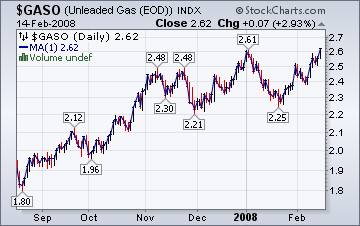 The Kansas City Star has an excellent review of the potential path for gasoline prices in the near future.
The Kansas City Star has an excellent review of the potential path for gasoline prices in the near future.
The Federal Energy Information Administration on Tuesday projected the price of regular gasoline, now averaging $2.96 per gallon nationwide, will hit nearly $3.40 by this spring. The prediction of higher gasoline prices comes even as the economy is slowing. The federal agency is suggesting that supplies are tight enough to push gasoline prices over the record set last May.
Arctic blasts put strain on natural gas.
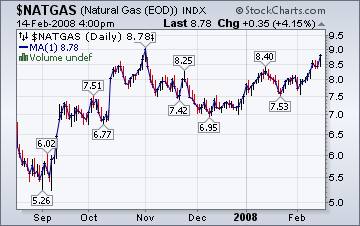 The Natural Gas Weekly Update reports, “ Unlike in the previous report week, when prices eased despite colder temperatures, the even colder temperatures this week led to price increases at virtually all market locations, reflecting an increase in space heating demand. Price increases at market locations in the Lower 48 States ranged between $0.11 and $1.96 per MMBtu this week.”
The Natural Gas Weekly Update reports, “ Unlike in the previous report week, when prices eased despite colder temperatures, the even colder temperatures this week led to price increases at virtually all market locations, reflecting an increase in space heating demand. Price increases at market locations in the Lower 48 States ranged between $0.11 and $1.96 per MMBtu this week.”
“Walking away” as a business decision.”
Mike Shedlock (Mish) has another view on walking away from business obligations. Apparently, in the business world, it happens more than you would think. In this environment, do we need two drugstores or fast food restaurants on every corner? Not hardly. Yet there has been a commercial building boom recently that flies in the face of economic sense.
"Some companies are closing stores to increase profitability, some are doing it just to stay alive. A lot of retailers already had their plans for 2008 laid out, had already invested in signed leases, ground-breakings, pre-opening, etc, so they couldn't just stop those new stores on a dime. Looking back on that, they're going to wish they had just walked away and paid whatever it would have cost them to stop the process.... For the next decade, retailers are not going to have to open a brand new store because there's going to be so many empty ones that need to be filled."
We're on the air every Friday.
Tim Wood of www.cyclesman.com , John Grant and I are back in our weekly session on the markets. This week should be fascinating. You will be able to access the interview by clicking here .
New IPTV program starting in March.
I will be a regular guest on www.yorba.tv starting on Thursday, March 6 th at 4:00 pm EDT . Stay tuned for news and views!
Please make an appointment to discuss our investment strategies by calling Claire or Tony at (517) 699-1554, ext 10 or 11. Or e-mail us at tpi@thepracticalinvestor.com .
Regards,
Anthony M. Cherniawski,
President and CIO
http://www.thepracticalinvestor.com
As a State Registered Investment Advisor, The Practical Investor (TPI) manages private client investment portfolios using a proprietary investment strategy created by Chief Investment Officer Tony Cherniawski. Throughout 2000-01, when many investors felt the pain of double digit market losses, TPI successfully navigated the choppy investment waters, creating a profit for our private investment clients. With a focus on preserving assets and capitalizing on opportunities, TPI clients benefited greatly from the TPI strategies, allowing them to stay on track with their life goals
Disclaimer: The content in this article is written for educational and informational purposes only. There is no offer or recommendation to buy or sell any security and no information contained here should be interpreted or construed as investment advice. Do you own due diligence as the information in this article is the opinion of Anthony M. Cherniawski and subject to change without notice.
Anthony M. Cherniawski Archive |
© 2005-2022 http://www.MarketOracle.co.uk - The Market Oracle is a FREE Daily Financial Markets Analysis & Forecasting online publication.



